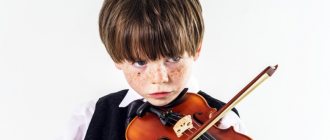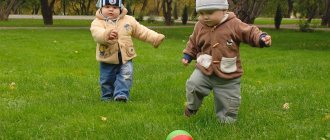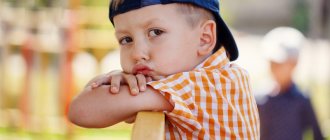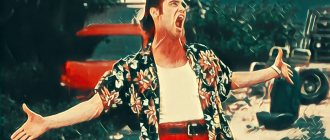Concept of giftedness
Definition 1
Giftedness is a systemic quality of the psyche that develops throughout life, determining a person’s ability to achieve high and outstanding results in one or several types of activity at the same time (in comparison with other people).
Definition 2
A gifted child is a child who differs from other children in his extraordinary, bright and outstanding achievements in a certain type of activity.
Currently, scientists in the field of psychology and pedagogy have proven that giftedness is a qualitative originality and the result of a complex interaction between the sociocultural environment and hereditary personality traits, mediated by the child’s activities. It should also be noted that for the development of giftedness, the child’s own activity and the psychological mechanisms of his self-development, which form the basis for the formation and subsequent implementation of individual giftedness, are of great importance.
Are you an expert in this subject area? We invite you to become the author of the Directory Working Conditions
Definition 3
Childhood is the age period during which the formation and development of the child’s abilities and personal qualities takes place.
Childhood is characterized by deep integrative processes in the child’s psyche.
One of the most pressing and frequently discussed issues in the field of giftedness is the question regarding the frequency of manifestation of children's giftedness. Answering this question, two points of view are put forward, which are essentially opposite:
“Every child is gifted from birth”
“Children who are truly gifted are extremely rare”
Proponents of the first point of view believe that any child with normal development can be developed to the level of giftedness, provided that the necessary favorable conditions for upbringing and learning are created.
Proponents of the second point of view, on the contrary, believe that giftedness is a unique phenomenon. Children with giftedness must be sought for the purpose of their further development, carried out in specially organized conditions.
Finished works on a similar topic
Coursework The concept of giftedness in pedagogy 400 ₽ Essay The concept of giftedness in pedagogy 240 ₽ Examination The concept of giftedness in pedagogy 210 ₽
Receive completed work or specialist advice on your educational project Find out the cost
System of working with gifted children
The state system of working with gifted children includes several levels. The basis of this system is the school, which covers the widest possible range of children. At the school level, it is essential that teachers have the skills to recognize the giftedness of their students and create optimal conditions for them in terms of learning and relationships with peers. And, if necessary, show ways of contacting out-of-school institutions that work with gifted children; It is also desirable that the school allows teaching according to flexible programs that allow those students who need it to gain additional knowledge, which is very rare. Schools in large cities have more opportunities to organize special education for gifted children than, for example, schools in rural areas, although this is not often the case. Therefore, boarding schools for gifted children can be recommended for especially gifted children from rural areas.
In general, as practice shows, 90% of traditional school teaching is dominated by the teacher’s monologue, designed to convey ready-made knowledge to students. Even in those lessons where dialogue is present, its functions are mainly limited to reproducing the topic. Teachers do not pay attention to the content of assignments, the nature and form of questions and their place in the teaching system. In most cases, they use tasks of a reproductive nature that are focused on unambiguous answers and do not activate the student’s mental activity. Therefore, the additional education system plays an important role in the development of a gifted child. Accordingly, the next level of vacation centers for gifted children is being formed, who speak different languages and are able to give a strong impetus to the child’s intellectual development in order to develop motivation for care even during the school year. The most famous in Europe are the summer recreation centers for gifted children of the Cadmus international school in the UK and the international recreation center of the French association ALREP.
Extracurricular clubs, studios and creative workshops provide opportunities to pursue interests beyond the curriculum.
At a special level is work related to the early professionalization of gifted children. We are talking about those children who have shown ability in a particular area at a very early age and have received training in that area.
Public associations play a significant role in organizing systematic work with gifted children. They complement government structures, reflecting a wider range of opinions on the problems of educating gifted children.
Working with gifted children is one of the ways to concretely realize the human right to individuality. In general, mass education is one of the most important institutions of modern society. By its nature, this education is obliged to take care of the majority of students first. However, a school aimed at the average level turns out to be ill-equipped for those who differ greatly from this average level, both in the direction of lesser and greater ability.
Unfortunately, much less has been done for children who, according to various indicators, exceed the age norm. However, it is highly gifted people who can make the greatest contribution to the development of society, and wasting talent is an unacceptable mistake for the development of the state.
And therefore, the law and the obligations of working with gifted children have adopted a system of additional education. The term "additional education" can be associated with the number of new ones. Initially, pedagogical phenomena related to these problems were called by other terms: “extracurricular”, “extracurricular”, “extracurricular”, “extracurricular work”. But, despite the relative novelty of this term, we can say with a high degree of confidence that it is outdated, since it has not yet had time to become properly entrenched in educational literature and in the public consciousness. This is due to the high dynamics of changes in the field of home education.
It is obvious that in recent years the system of additional education has transformed from a “superstructure” to basic education, which in fact was its predecessor - the system of extracurricular and extracurricular activities, into a leading factor in the formation of a person’s “educational personality”.
Additional education is a purposeful process of training and education through the implementation of additional educational programs, the provision of additional educational services and formative educational activities outside the main educational programs, in the interests of human society.
Signs of giftedness
The first signs of giftedness appear in a child during preschool childhood. Their identification is carried out by observing the nature of the child’s activities. The main aspects of the leading signs of gifted behavior are motivational and instrumental:
- Instrumental – determines the nature of the methods of activity.
- Motivational – determines the nature of the child’s relationship to the surrounding reality and his own activities.
The main signs of the instrumental aspect of the behavior of a gifted child:
- Rapid mastery of methods and techniques for performing one or another type of activity, its successful implementation.
- The invention and application of new, more effective methods and techniques of activity to resolve necessary life situations.
- Deep mastery of subjects, on the basis of which new goals of activity are put forward, aimed at a new vision of the situation and its subsequent successful resolution.
For a child who is truly gifted, it is the third sign of behavior that is characteristic.
Definition 4
Innovation is a kind of going beyond the requirements of the activity being carried out, allowing the child to discover new patterns and techniques.
The main features of the motivational aspect of gifted behavior:
- High sensory selectivity to certain aspects of objective reality (sounds, smells, colors, plants, etc.), and certain forms of one’s activity (physical, cognitive, artistic, etc.).
- High cognitive needs, manifested in increased curiosity, as well as the desire to go beyond the initial requirements of educational and cognitive activity.
- High interest in certain types or areas of activity, passion for a specific subject, immersion in doing something. This interest is manifested in perseverance, perseverance, hard work, preference for contradictory, paradoxical and non-standard scientific information, non-acceptance and rejection of templates and standards.
- Increased demands on the results of one’s work, the desire to set extremely difficult goals and perseverance in achieving them, a tendency to self-improvement, self-education and self-development.
Teacher and gifted child
We looked at all types of giftedness. Working with gifted children also requires attention, since these children are unique and require special treatment. So, there is a whole list of forms of working with them:
- The teacher should organize creative workshops to develop children's talent.
- Separate group classes are required in practice, which are attended by the strongest children from parallel classes.
- The teacher is obliged to conduct additional electives in those subjects that are especially easy for gifted children.
- The school should organize hobby groups where children can freely realize their potential.
- The teacher should engage in research activities together with the child.
- To diversify children's lives, as well as to increase their level of motivation, various competitions, relay races, and competitions are held.
- Gifted children should take part in various Olympiads and conferences.
- If a child really has high achievements in a certain area of knowledge, then it makes sense to develop an individual work plan for him, according to which he will work together with the teacher.
- If truly talented children have been identified at the school, then joint work is organized with universities of a certain focus. This is necessary so that this child can move on, reach even greater heights and subsequently have the opportunity to receive not only a good higher education, but also a decent job.
Your psychologist. The work of a psychologist at school.
1. What language does the word “prodigy” come from? a) English b) German c) French d) Italian2. What does the word “prodigy” mean? a) a miracle child b) smart c) brilliant d) gifted 3. Who, explaining the achievements of outstanding artists and poets, wrote “not from art and knowledge, but from divine predestination and giftedness”? a) Plato b) Democritus c) Pythagoras d) Aristotle 4. From what language did the term genius (“spirit”) come? a) Latin b) German c) Greek d) Spanish 5. What does the term “talent” mean in translation (from the Greek talanton)? a) education b) upbringing c) large measure of gold d) clothing 6. Who proposed the term “blank slate”? a) J. Locke b) D. Diderot c) Helvetius d) G. Leibniz 7. The author of which treatise is I. Kant? a) - About genius b) - Heredity of talent: its laws and consequences c) - Paradox about the actor d) - About the constituent elements of an artistically thinking mind 8. Who did not share F. Galton’s concept of genetically determined and fixed intelligence? a) A. Binet b) L. Theremin c) R. Cattell d) J. Raven 9. What concept was introduced into psychology by the scientist D. Hebb? a) genotypic intelligence b) intelligence quotient c) mental abilities d) social intelligence 10. At the turn of what century did a functional approach to giftedness appear within the framework of associative psychology? a) 19-20 centuries b) 18-19 centuries c) 17-18 centuries d) 16-17 centuries 11. What is the merit of the famous Russian scientist G.I. Rossolimo? a) introduced the concept of giftedness b) created methods for diagnosing intellectual giftedness c) described genius as a phenomenon d) defined the IQ 12. “Giftedness is the level and at the same time the type of an individual’s response to the demands of life.” Who expressed this opinion? a) V. Stern b) E. Claparède c) V. Lowenfeld d) J. Renzuli 13. Until when was giftedness determined solely by intelligence tests? a) before the beginning 19th century b) before the beginning 20th century c) to mid. 19th century d) to mid. 20th century 14. J. Gilfred’s model of the structure of intelligence suggests, according to the author’s playful statement, about ____ ways to be smart. a) 120 b) 110 c) 130 d) 140 15. Which specialist, analyzing the approaches of most domestic and foreign authors to the problem of the relationship between intelligence and creativity, identifies 3 main positions? a) A.M. Matyushkin b) K.D. Biryukov c) V.N. Druzhinin d) M.A. Kholodnaya 16. “Gifted children are not created by a good school; It is obvious that this process has a fundamentally different technique.” Who expressed this opinion? a) V. Stern b) E. Claparède c) V. Lowenfeld d) J. Renzuli 17. Which Soviet scientist believes that there is and cannot be anything innate or genetically inherited in the higher mental functions of a person; the human psyche is the result of upbringing in the broad sense of the word? a) E.V. Ilyenkov b) K.D. Biryukov c) V.N. Druzhinin d) M.A. Kholodnaya 18. Who is the author of the cultural-historical theory of the development of higher mental functions? a) L.S. Vygotsky b) A.N. Leontiev c) S.L. Rubinstein d) B.M. Teplov 19. Proponents of which theory believed that development, considered as the individual’s transition to a higher level, is the result of biological maturation of the organism and its interaction with the environment? a) - probabilistic theory b) - evolutionary theory c) - revolutionary theory d) - basic biological law 20. During the study of the biographies of 400 outstanding people, it was found that __% of them had serious problems during schooling in terms of adapting to conditions school life? a) 50% b) 40% c) 60% d) 65% 21. Which famous specialist in the field of studying children's giftedness claims that a special need for mental search, for mental stress is characteristic of gifted children, even those whose extraordinary abilities are visible not right away? a) N.S. Leites b) A.N. Leontiev c) S.L. Rubinstein d) B.M. Teplov 22. Who owns the statement “Knowledge begins with surprise”? a) Plato b) Socrates c) Democritus d) Aristotle 23. Who said the words: “Everything seems self-evident only to those whose mind is still inactive”? a) S.L. Rubinshtei b) L.S. Vygotsky c) A.N. Leontiev d) B.M. Teplov 24. Who introduced the concept of “cognitive amateur activity” into psychology? a) D.B.Bogoyavlenskaya b) Z.I.Kalmykova c) A.M.Matyushkin d) K.Dunker 25. Who proposed the terms “divergent thinking” and “divergent tasks”? a) D. Guilford b) A. Binet c) R. Cattell d) J. Raven 26. What did experts S. Keyplan, D. Sisk, P. Torrence consider as the main feature of the thinking of a creatively gifted person? a) original thinking b) ease of generating ideas (productive thinking) c) flexibility of thinking d) propensity for divergent type tasks 27. “The ability to evaluate provides opportunities for self-sufficiency, self-control, and confidence of a gifted, creative child in himself, in his abilities.” Who owns these words? a) A.M. Matyushkin b) Z.I. Kalmykova c) A.M. Matyushkin d) K. Dunker 28. Who made a significant contribution to the development of problems of self-actualization? a) A. Maslow b) Binet c) R. Cattell d) J. Raven 29. What is the name of the scientist who wrote: “The school makes little use of their capabilities, shows almost no concern for their further growth? a) N.S. Leites b) A.M. Matyushkin b) Z.I. Kalmykova c) A.M. Matyushkin 30. “Gifted children, just like their “normal” peers, often do not understand that those around them for the most part, they differ significantly from them in thoughts, desires, and actions.” Who owns these thoughts? a) J. Piaget b) Binet c) R. Cattell d) J. Raven 31. Who is the author of the “concept of egocentrism”? a) J. Piaget b) D. Sisk c) Binet d) K. Tackex 32. Until what age, according to T. Hunt, does the development of a test to “identify the ability to deal with people” develop social intelligence? a) 17-18 b) 15-16 c) 16-17 d) 18-19 33. To whom does the following statement belong: “... one should distinguish between foreseeing the future scale of achievements and assessing the qualitative characteristics of talent?” a) K. Taylor b) B. M. Teplov c) T. Hunt d) Binet 34. Based on research, which scientist concluded that half of all gifted children identified in primary school are girls? a) B. Clark b) L. Hollingworth c) L. Theremin d) R. Sternberg 35. In what year did J. Maker (USA) conduct a study, as a result of which it was discovered that children with different types of zyphic disabilities have pronounced features in cognitive development? a) 1971 b) 1970 c) 1991 d) 1990
36. Who were A. Einstein, H. C. Andersen, Woodrow Wilson at school? a) dyslexics b) “black sheep” c) “on their own” d) “ugly ducklings” 37. Who believed that signs of intelligence always have a more generalized, complex nature? a) F. Galton b) A. Binet c) W. Sinclair d) D. Armheim 38. Which scientist made a significant contribution to the justification and development of observation as a psychological method? a) M.Ya. Basov b) V.S. Yurkevich c) A.F. Lazursky d) D. Magidsson 39. Continue the statement of the American author: “the best forecast of a person’s future behavior is ______? a) past b) present c) profession d) health 40. Which scientist characterizes mentoring as the most promising form of training for children with outstanding abilities? a) P. Torrance b) E. Kraepelin c) W. Sinclair d) D. Armheim 41. Who owns the words: “All special abilities of a person are, in the end, different manifestations, aspects of his general ... ability to learn and work? a) Z.I. Kalmykova b) M.Ya. Basov c) S.L. Rubinshtein d) V.S. Yurkevich 42. Which scientist was involved in a comprehensive study of gifted children and identified the structure of mathematical abilities? a) V.A. Krutetsky b) A.M. Matyushkin b) Z.I. Kalmykova c) A.M. Matyushkin 43. What does the “three-ring model of J. Renzuli” not include? a) above average intelligence b) genius c) enhanced motivation d) creative abilities 44. Who at the beginning of the 20th century suggested that giftedness is based on a special “mental energy”, which, being constant for an individual, significantly distinguishes people from each other ? a) E. Kraepelin b) P. Torrance c) A. Binet d) C. Spearman 45. Who opposed “narrow intellectualism”? a) A.F. Lazursky b) B.M. Teplov c) M.Ya. Basov d) D. Magidsson
Keys to the test
1b
| 10a | 19b | 28a | 37b | |
| 2a | 116 | 20v | 29a | 38a |
| Behind | 12a | 21a | 30a | 39a |
| 4a | 13g | 22a | 31a | 40a |
| 5v | 14a | 23a | 32a | 41v |
| 6a | 15v | 24a | 336 | 42a |
| 7a | 16a | 25a | 34a | 436 |
| 8a | 17a | 26a | 35a | 44g |
| 9a | 18a | 27a | 36 a,b | 45b |
Source: Author-compiler: teacher of the department of applied psychology of the Voronezh State University named after. P.M. Masherova" E.V. Shketik
Is it good to be gifted?
Of course, a child’s development cannot be limited only to the family. But not every type of giftedness is related to school and finds conditions for development there. For example, the so-called social (leadership) talent, for obvious reasons, is not always encouraged by teachers and even parents. They simply don't know what to do with such children.
Early manifested talent in the arts (musical, artistic, acting) or in sports probably has no direct relation to school either. Often such a child does not feel very comfortable at school: due to constant employment, he communicates less with classmates, and often misses classes due to concerts or competitions. Such children often have emotional problems due to high competition with other children in their “specialty.”











